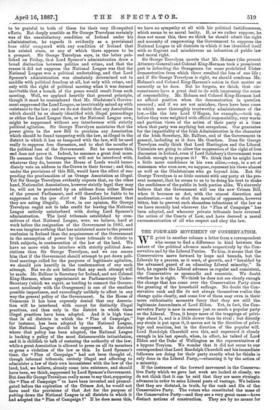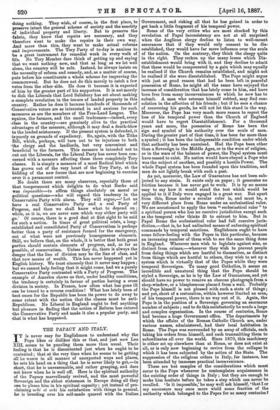THE FORWARD MOVEMENT OF CONSERVATISM.
WE print in another column a letter from a correspondent who seems to find a difference in kind between the nature of the political advance made respectively by the Con- servative and by the Liberal Parties. To him, it seems that the Conservatives move forward by leaps and bounds, but the Liberals by a process, as it were, of growth, and "heralded by the advanced guard of an educating Liberal minority." In fact, he regards the Liberal advance as regular and consistent, the Conservative as spasmodic and eccentric. We doubt whether he is right. We think he does not see clearly enough the change that has come over the Conservative Party since the granting of the household suffrage. No doubt the Con- servative rank and file do not always themselves realise the change quite clearly, and some few of them may even in their more enthusiastic moments fancy that they are still the legitimate descendants of Lord Eldon. Yet, in fact, the Con- servative Party is now in essence just as much a popular party as the Liberal. True, it keeps more of the trappings of privi- lege about it, and is a little slower than its rival ; but directly any strain is put upon it, it moves not in the direction of privi- lege and reaction, but in the direction of the popular wilL Lord Randolph Churchill sees this, and expressed it clearly enough in his last speech, when, in effect, he talked of Lord Eldon and the Duke of Wellington as the representatives of a bygone Toryism. We wonder that it did not occur to our correspondent that Lord Randolph Churchill and his immediate followers are doing for their party exactly what he thinks is only done in the Liberal Party,—educating it by the action of a minority.
If the instances of the forward movement in the Conserva- tive Party which we gave last week are looked at closely, we do not think that it can be said that they are mere strategic advances in order to seize Liberal posts of vantage. We believe that they are dictated, in truth, by the rank and file of the Conservative Party. The voters who constituted the mass of the Conservative Party—and they are a very great mass—have distinct notions of construction. They are by no means for
doing nothing. They wish, of course, in the first place, to preserve intact the general scheme of society and the sanctity of individual property and liberty. But to preserve the 'fabric, they know that repairs are necessary, and they therefore want to make the repairs in their own way. And more than this, they want to make actual reforms and improvements. The Tory Party of to-day is anxious to be a great instrument for remedial work in every walk of We. No Tory Member dare think of getting up and saying that we want nothing new, and that as long as we let well alone, the country will be safe. Instead, he always insists on the necessity of reform and remedy, and, as a matter of course, puts before his constituents a whole scheme for improving the commonweal. But he does not do this merely to catch a few votes from the other side. He does it because it is expected of him by the greater part of his supporters. It is not merely to dish the Liberals that Lord Salisbury has set about making :a-complete revolution in the tenure of landed property in this country. Rather he does it because hundreds of thousands of 'Conservative voters are as interested in and anxious for such measures as are the members of the Free-Land League. The squires, the farmers, and the small tradesmen—indeed, every 'class in the country—are genuinely alive to the practical advantages of the measure, although it may deal a death-blow to the landed aristocracy. If the present system is defended, it ispurely on grounds of expediency. So, again, with the Tithe Bill, which, perhaps, will turn out to be injurious to both -the clergy and the landlords, but very convenient and beneficial to the farmers. This measure is intended not to cut out the Liberals, for the Liberal Party has never been con- cerned with a measure affecting these three completely Tory classes. It is simply a measure of a most Radical kind which has grown out of the very heart of the Tory Party, at the bidding of the new forces that are now beginning to exercise over it a paramount control. No doubt there are many observers, especially those of that temperament which delights to do what Burke said was impossible—to affirm things absolutely on moral or political questions—who will regard this tendency in the Conservative Party with alarm. They will argue,—' Let us have a real Conservative Party and a real Party of Progress, and then we shall know what to depend on ; while, as it is, we are never sure which way either party will go.' Of course, there is a good deal at first sight to be said for such a notion. In times of great political crisis, a long- established and consolidated Party of Conservatism is perhaps 'better than a party of resistance formed for the emergency, out of what were not previously homogeneous elements. Still, we believe that, on the whole, it is better that both great parties should contain elements of progress, and, as far as possible, of conservatism. Unless they do, there is always the danger that the line of division may be the line of class, and that now means of wealth. This has never happened yet in English history. We trust sincerely that it never may happen ; but we cannot help feeling that it might come, had we a purely Conservative Party contrasted with a Party of Progress. The example of America shows us that, under healthy conditions, the tendency is certainly in favour of parties having a cross division in society. In France, how often what has gone ill can be traced to a reverse condition I What has lately been of best omen for the Republic has been its power to do away to some extent with the notion that the classes must be anti- Republican. No Liberal in England ought to feel anything but pleasure in finding that the notion of Reform has entered the Conservative Party and made it also a popular party, and that is what has happened.



































 Previous page
Previous page